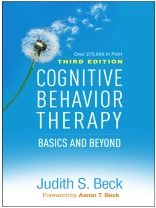Hundreds of thousands of clinicians and graduate students have relied on this text–now significantly revised with more than 50% new material–to learn the fundamentals of cognitive behavior therapy (CBT). Leading expert Judith S. Beck demonstrates how to engage patients, develop a sound case conceptualization, plan individualized treatment, structure sessions, and implement core cognitive, behavioral, and experiential techniques. Throughout the book, extended cases of one client with severe depression and another with depression, anxiety, and borderline personality traits illustrate how a skilled therapist delivers CBT and troubleshoots common difficulties. Adding to the third edition’s utility, the companion website features downloadable worksheets and videos of therapy sessions.
New to This Edition
- Chapter on the therapeutic relationship.
- Chapter on integrating mindfulness into treatment.
- Presents recovery-oriented cognitive therapy (CT-R)–which emphasizes clients’ aspirations, values, and positive adaptation–alongside traditional CBT.
- Pedagogical features: clinical tips, reflection questions, practice exercises, and videos at the companion website.
- New case examples featuring clients with more complex problems.
- Demonstrates how to integrate strategies from other modalities, such as acceptance and commitment therapy, dialectical behavior therapy, and mindfulness-based cognitive therapy.
Cuprins
Foreword, Aaron T. Beck
1. Introduction to Cognitive Behavior Therapy
2. Overview of Treatment
3. Cognitive Conceptualization
4. The Therapeutic Relationship
5. The Evaluation Session
6. The First Therapy Session
7. Activity Scheduling
8. Action Plans
9. Treatment Planning
10. Structuring Sessions
11. Problems in Structuring Sessions
12. Identifying Automatic Thoughts
13. Emotions
14. Evaluating Automatic Thoughts
15. Responding to Automatic Thoughts
16. Integrating Mindfulness into CBT
17. Introduction to Beliefs
18. Modifying Beliefs
19. Additional Techniques
20. Imagery
21. Termination and Relapse Prevention
22. Problems in Therapy
Appendix A. CBT Resources
Appendix B. Beck Institute Case Write-Up: Summary and Conceptualization
Appendix C. Steps in the AWARE Technique
Appendix D. Restructuring the Meaning of Early Memories through Experiential Techniques
Despre autor
Judith S. Beck, Ph D, is President of the Beck Institute for Cognitive Behavior Therapy (www.beckinstitute.org), a nonprofit organization that provides state-of-the-art training and certification in CBT to individuals and organizations, offers online courses on a variety of CBT topics, conducts research, and serves as a leading global resource in CBT. She is also Clinical Professor of Psychology in Psychiatry at the University of Pennsylvania Perelman School of Medicine. Dr. Beck has written over 100 articles and chapters as well as books, workbooks, and pamphlets for professionals and nonprofessionals, including Cognitive Behavior Therapy, Third Edition: Basics and Beyond and Cognitive Therapy for Challenging Problems: What to Do When the Basics Don’t Work. She has made hundreds of presentations nationally and internationally on various applications of CBT and is the primary developer of the Beck Institute’s online CBT training courses, which have been taken by health and mental health professionals in over 130 countries. Dr. Beck maintains a clinical caseload at the Beck Institute’s in-house clinic in suburban Philadelphia, helping clients who are experiencing a range of challenges.












